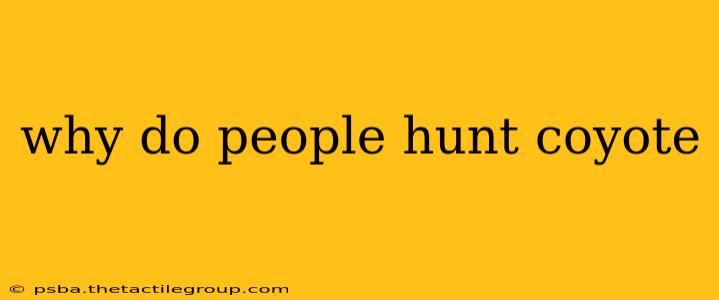Coyote hunting is a contentious topic, sparking passionate debate among conservationists, farmers, ranchers, and hunters alike. Understanding the motivations behind coyote hunting requires exploring the multifaceted perspectives involved. While some view it as a necessary management tool, others see it as ethically questionable and potentially harmful to the ecosystem. This article delves into the various reasons why people hunt coyotes, examining both the practical and the controversial aspects.
Practical Reasons for Coyote Hunting:
-
Livestock Protection: This is perhaps the most prevalent reason. Coyotes are opportunistic predators, and their presence can pose a significant threat to livestock, particularly sheep, goats, and poultry. Ranchers and farmers often resort to hunting to protect their livelihoods and minimize economic losses caused by coyote predation. The perceived effectiveness of hunting in controlling livestock depredation is a key driver.
-
Wildlife Management: Game management agencies often employ coyote hunting as a tool to regulate coyote populations and maintain a balance within the ecosystem. Controlling coyote numbers is believed to help protect vulnerable game species, such as deer and rabbits, although the effectiveness of this strategy is often debated.
-
Disease Control: Coyotes can carry various diseases that could potentially affect other wildlife or even domestic animals. Hunting can be seen as a means to help limit the spread of these diseases, although this is a less emphasized rationale compared to livestock protection and wildlife management.
Controversial Aspects and Ethical Considerations:
-
Ineffectiveness of Hunting: Many studies suggest that coyote hunting is often ineffective in significantly reducing coyote populations. Coyotes are highly adaptable and reproduce rapidly, meaning that hunting often leads to a temporary decrease in numbers, quickly followed by a resurgence. This has fueled criticism of the practice as a costly and ultimately futile endeavor.
-
Ecological Impact: Coyotes play a vital role in the ecosystem as both predator and prey. Their removal can have cascading effects on other species, potentially disrupting the delicate balance of the food web. Concerns exist about the potential impact on biodiversity and the overall health of the ecosystem.
-
Ethical Concerns: The methods used in coyote hunting, such as trapping and snaring, often raise ethical concerns among animal welfare advocates. These methods can inflict pain and suffering on the animals, leading to considerable opposition from those who view them as inhumane. The use of calls to lure coyotes, sometimes exploiting their natural behavior, is also a subject of ethical debate.
Conclusion: A Complex Picture
The reasons why people hunt coyotes are multifaceted and often intertwined with personal beliefs, economic necessities, and ecological considerations. While livestock protection and wildlife management are frequently cited justifications, the effectiveness and ethical implications of coyote hunting remain a source of ongoing debate. A deeper understanding of the ecological role of coyotes, coupled with the exploration of non-lethal control methods, is crucial to finding sustainable solutions that balance human interests with the preservation of biodiversity. Further research and a more nuanced approach are needed to effectively address the complex challenges posed by coyote populations while minimizing potential negative impacts on the environment and wildlife.

